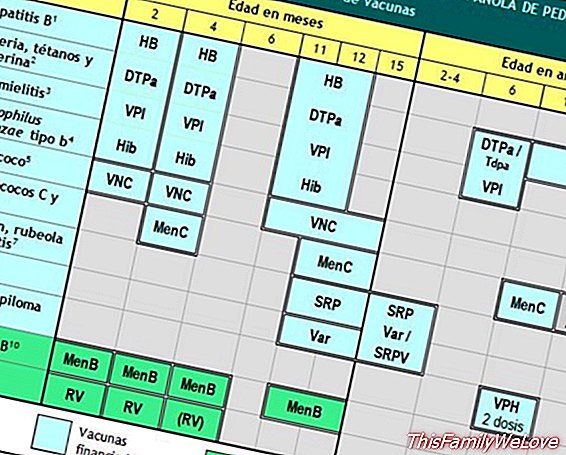Vaccination calendar: all the news
The vaccinations they are the best immunization system for all babies and children to eradicate diseases. Have a Vaccine schedule common is essential, as well as updating it properly so that the vaccination system be really effective for the whole population.
Concretely, eThe vaccine calendar recommended by the AEP comes loaded with news that the Interterritorial Council of the National Health System under the Ministry of Health, Social Services and Equality, and the autonomous communities adapt and apply according to their criteria.
The amazing changes in the vaccine schedule
As the main novelty in the child vaccination calendar of the Spanish Association of Pediatrics AEP highlights the recommendation of fewer doses of vaccines for babies, than in previous calendars. This has suppressed some doses of vaccines that were put to babies at 6 and 18 months. But also, these are the most important changes:

1. Hexavalent vaccine. The hexavalent vaccine is effective against diphtheria, tetanus, whooping cough, Haemophilus influenzae type b, hepatitis B. The change that is included in the vaccination calendar this year is that it goes from 3 doses to 2-4-6 months and a fourth without Hepatitis B at 18 months to a new dosing schedule at 2 months, 4 and 12 months. That is, a lower dose of hexavalent vaccine is given.
2. Poliomyelitis vaccine. A fourth dose of poliomyelitis is added at age 6, when the tetanus, diphtheria and whooping cough vaccine is administered.
3. Meningococcal vaccine. The AEP recommends vaccination against meningococcus of serogroups A, C, W, Y and proposes to replace the vaccine dose against meningococcal C of 12 years with the tetravalent conjugate preparation. Regarding vaccination against serogroup B meningococcus, the Vaccine Committee of the ASP recommends the inclusion of this vaccination in the systematic schedule, starting at 2 months of age.
4. Whooping cough vaccine.It's back to top now because of the whooping cough outbreaks that they suggested last year. Therefore, the recommendation is to continue with a dose at 6 years and with a reminder at 11-12 years. Thus, the AEP insists on getting the whooping cough vaccine together with the diphtheria and tetanus that is administered at 11-12 years of age.
5. Prevenar Vaccine. The vaccination schedule of the Prevenar vaccine is modified, since this year the vaccine is introduced throughout the country, at a rate of 2-4-12 months. By immunizing all children, group immunity makes it possible to administer a lower dose.
6. Meningococcal B vaccine. It is recommended the introduction of the vaccine against meningococcal B, Bexsero, to the systematic calendar (it does not make sense that the C is administered without cost and the parents have to pay the B) with a guideline 3-5-7 and a booster dose between 13 and 15 months (or the pattern that should be carried out according to the age of the baby, since after 6 months the recommended doses are three in total and after 2 years are two).
7. Viral triple vaccine. The vaccination guideline for the triple virus is maintained.
8. Varicella vaccine. The definitive inclusion of the varicella vaccine in the official calendar is requested, and the 2-dose patua is recommended, extending the age of application of the second dose to 4 years (between 2 and 4 years of margin).
9. Vaccine against HPV. It is recommended to complete the vaccination change for girls aged 14 to 11-12 years and to report vaccination, with a tetravalent preparation, in males 11-12 years of age.
10. Vaccines in pregnancy. Out of the schedule of childhood vaccination, the recommendation to vaccinate all pregnant women after the 27th week of pregnancy of the tetanus, diphtheria and whooping cough vaccine is recommended, in order to protect the baby from the latter disease. This vaccine is more important than that given to children aged 6 years (there is currently limited supply and the vaccine is exactly the same, so it is considered a priority to vaccinate pregnant women before 6 years old children).
In addition, for when there is more dose, it is recommended to vaccinate members of the family environment of newborns, especially the mother in the immediate puerperium if during pregnancy has not been vaccinated.
Marisol Nuevo Espín




